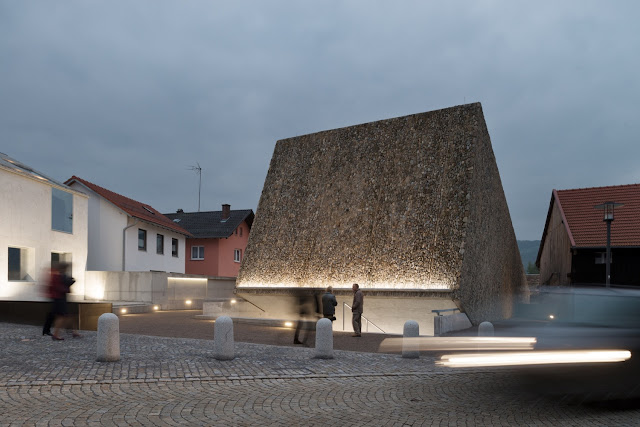Honeycomb: The Formstelle Pavilion | DETAIL daily:
archopotamus
Architectural Information Repository
Friday, August 19, 2016
Open-source parametric brick wall “hacks the digital” in Iran - Archpaper.com
Open-source parametric brick wall “hacks the digital” in Iran - Archpaper.com
 Archpaper:
Archpaper:
Sstudiomm, an Iranian architecture office founded by Hossein Naghavi, has developed a digital brick laying technique and an open-source DIY kit for architects interested in the system. The project, titled Negative Precision, is the outcome of Naghavi’s independent research into parametrically derived brick laying techniques. Using Kohler and Gramazio’s 2006 robotically programmed wall as a departure point, sstudiomm sought out alternative methods to reproduce the same effect with a limited budget, “in order to make the luxurious reachable for a greater group.”
 Archpaper:
Archpaper:Sstudiomm, an Iranian architecture office founded by Hossein Naghavi, has developed a digital brick laying technique and an open-source DIY kit for architects interested in the system. The project, titled Negative Precision, is the outcome of Naghavi’s independent research into parametrically derived brick laying techniques. Using Kohler and Gramazio’s 2006 robotically programmed wall as a departure point, sstudiomm sought out alternative methods to reproduce the same effect with a limited budget, “in order to make the luxurious reachable for a greater group.”
Labels:
Brick,
Details,
Div 04 Masonry,
Div 09 Finishes,
Materials,
Patterning,
Technology
Saturday, October 31, 2015
Saturday, November 22, 2014
Sunday, October 26, 2014
Shadow Box Design
From HOLT Architects:
Our typical shadow box detail specifies a composite aluminum panel for the interior closure material. We have recently run into issues with the panel deforming and expressing waves. The theory is that this is due to the interior plastic core of the panel melting. Allucobond is rated to 170-180 degrees, but due to the dark color that was selected for this project it may have been possible.
Our typical shadow box detail specifies a composite aluminum panel for the interior closure material. We have recently run into issues with the panel deforming and expressing waves. The theory is that this is due to the interior plastic core of the panel melting. Allucobond is rated to 170-180 degrees, but due to the dark color that was selected for this project it may have been possible.
In the future, when we design and specify shadowboxes we should simply use a 1/8” aluminum panel with a Kynar finish rather than the composite metal panel option. (see Breckenridge)
Venting of the space between the glass and the panel is also becoming a common practice. This can be done in two ways: 1. Removing 1” the interior glazing gasket at both top corners of the glass panel in front of the shadow box will let the air space vent into the glazing pocket. 2. Drilling two ¼” holes at the top of both sides of the vertical mullion within each shadowbox will let the air space vent into the vertical mullion. We should coordinate the preferred method of venting with the approved window manufacturer.
Channel Glass Double-Wall Skin Technical Information
Solar Transmission |
| Interior glass | Uncoated | Uncoated | Uncoated | Azur |
| Exterior glass | Uncoated | low-e | Azur | low-e |
| Visual Transmittance | 0.72 | 0.64 | 0.53 | 0.48 |
| SHGC | 0.66 | 0.61 | 0.56 | 0.53 |
| U=BTU/sq.ft.hr °F | 0.49 | 0.41 | 0.52 | 0.42 |
Bendheim Wall Systems Wall Glass Technical Specifications & Performance Data
Subscribe to:
Comments (Atom)




















